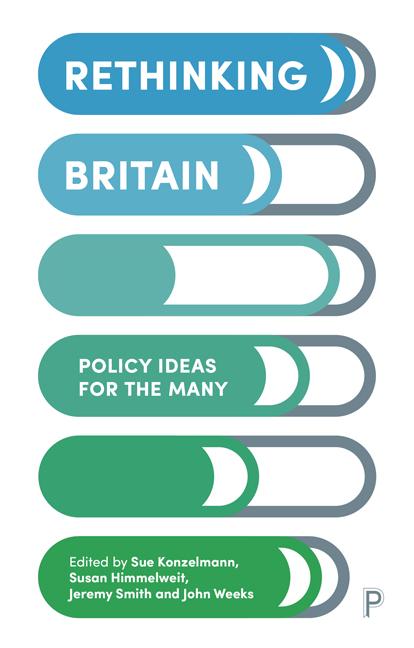Book contents
- Frontmatter
- Contents
- List of Tables and Figures
- The Contributors
- Foreword
- Introduction
- Interlude: ‘Mirror, Mirror, On the Wall – Who has the Highest Debt of All?’
- Part One Building a Full-Employment Economy: Introduction
- Part Two Public Investment – Prioritising Society Rather than Profit: Introduction
- Part Three Making Finance Work for Society: Introduction
- Part Four Genuine Social Security: Introduction
- Part Five How to provide for Social Needs: Introduction
- Conclusion
- Jargon Busters
- References and Further Reading
- Index
1 - How Could we Build Competitive New UK Industries?
Published online by Cambridge University Press: 11 March 2021
- Frontmatter
- Contents
- List of Tables and Figures
- The Contributors
- Foreword
- Introduction
- Interlude: ‘Mirror, Mirror, On the Wall – Who has the Highest Debt of All?’
- Part One Building a Full-Employment Economy: Introduction
- Part Two Public Investment – Prioritising Society Rather than Profit: Introduction
- Part Three Making Finance Work for Society: Introduction
- Part Four Genuine Social Security: Introduction
- Part Five How to provide for Social Needs: Introduction
- Conclusion
- Jargon Busters
- References and Further Reading
- Index
Summary
What's the issue?
Much has been made of the UK ‘jobs miracle’ since 2010, but many are low-paid, insecure jobs that not only need supplementary benefits to become a living wage, but also contribute to low productivity.
Building competitive new industries would create more, more secure – and better-paid – jobs, improving both society and productivity, but how do we do it?
Analysis
A new partnership between government and industry
Neither the UK's previous approach to nationalised industry nor the complete lack of interest by governments since 1980 helped industry thrive. Fortunately, these two extremes aren't the only choices available. Instead, the state and industrial organisations could work together, each contributing its own special skills – resulting in a much ‘smarter’ policy.
This might sound optimistic, but such cooperation already happens – and the UK can be incredibly good at it. The best example, so far at least, was initiated by a Conservative Prime Minister – and improved by the following Labour one – showing that politicians can indeed work successfully with organisations outside government. The transformation of the international competitiveness of Team GB – from zeroes in 1996 to the heroes they are today – offers clear insight into more effective industrial policy design.
If you look at the system that has been developed around the Department for Digital, Culture, Media & Sport's (DCMS) ‘arm’s-length’ operation, UK Sport, as an industrial sector that produces successful world-class athletes, its relevance to UK industry is hard to ignore.
Not only is this elite sport system highly successful, it was also born during a recession and following the British Olympic team's worst-ever performance in 1996. That leaves little excuse for not designing and implementing a proper industrial strategy now.
Nothing would have changed for Team GB, however, without government backing. This came in the form of the then Prime Minister John Major, who recognised sport's political value. In 1996, neither UK elite sport nor industry was getting much state support – to the point where Team GB cyclists, who now dominate the sport, even had to hand back their singlets so that others could use them in future events.
- Type
- Chapter
- Information
- Rethinking BritainPolicy Ideas for the Many, pp. 60 - 64Publisher: Bristol University PressPrint publication year: 2019



